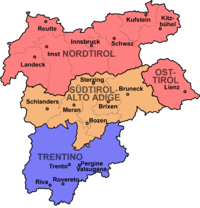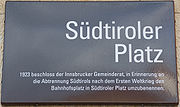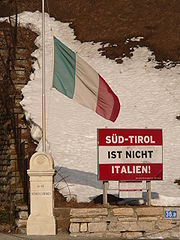
Italianization of South Tyrol
Encyclopedia

County of Tyrol
The County of Tyrol, Princely County from 1504, was a State of the Holy Roman Empire, from 1814 a province of the Austrian Empire and from 1867 a Cisleithanian crown land of Austria-Hungary...
(today South Tyrol
South Tyrol
South Tyrol , also known by its Italian name Alto Adige, is an autonomous province in northern Italy. It is one of the two autonomous provinces that make up the autonomous region of Trentino-Alto Adige/Südtirol. The province has an area of and a total population of more than 500,000 inhabitants...
) was inhabited by almost 90% German
German language
German is a West Germanic language, related to and classified alongside English and Dutch. With an estimated 90 – 98 million native speakers, German is one of the world's major languages and is the most widely-spoken first language in the European Union....
speakers. Under the 1939 South Tyrol Option Agreement
South Tyrol Option Agreement
The South Tyrol Option Agreement refers to the period between 1939 and 1943, when the native German and Ladin speaking people in South Tyrol and three communes in the province of Belluno were given the "option" of either emigrating to neighboring Nazi Germany or remaining in Fascist Italy and...
, Adolf Hitler
Adolf Hitler
Adolf Hitler was an Austrian-born German politician and the leader of the National Socialist German Workers Party , commonly referred to as the Nazi Party). He was Chancellor of Germany from 1933 to 1945, and head of state from 1934 to 1945...
and Benito Mussolini
Benito Mussolini
Benito Amilcare Andrea Mussolini was an Italian politician who led the National Fascist Party and is credited with being one of the key figures in the creation of Fascism....
determined the status of the German people living in the province. They could emigrate to Germany
Germany
Germany , officially the Federal Republic of Germany , is a federal parliamentary republic in Europe. The country consists of 16 states while the capital and largest city is Berlin. Germany covers an area of 357,021 km2 and has a largely temperate seasonal climate...
or the Greater German Reich's territory in the Crimea
Crimea
Crimea , or the Autonomous Republic of Crimea , is a sub-national unit, an autonomous republic, of Ukraine. It is located on the northern coast of the Black Sea, occupying a peninsula of the same name...
, or stay in Italy and accept their complete Italianization
Italianization
Italianization or Italianisation is a term used to describe a process of cultural assimilation in which ethnically non or partially Italian people or territory become Italian. The process can be voluntary or forced...
. As a consequence of this, the society of South Tyrol was deeply riven. Those who wanted to stay, the so-called Dableiber, were condemned as traitors while those who left (Optanten) were defamed as Nazis. Because of the outbreak of the World War II
World War II
World War II, or the Second World War , was a global conflict lasting from 1939 to 1945, involving most of the world's nations—including all of the great powers—eventually forming two opposing military alliances: the Allies and the Axis...
, this agreement was never fully implemented. Illegal Katakombenschulen ("Catacomb schools") were set up to teach children the German language.
Fascist period (1922-1945)

South Tyrol
South Tyrol , also known by its Italian name Alto Adige, is an autonomous province in northern Italy. It is one of the two autonomous provinces that make up the autonomous region of Trentino-Alto Adige/Südtirol. The province has an area of and a total population of more than 500,000 inhabitants...
had been formally annexed
Annexation
Annexation is the de jure incorporation of some territory into another geo-political entity . Usually, it is implied that the territory and population being annexed is the smaller, more peripheral, and weaker of the two merging entities, barring physical size...
, Italian place names, almost entirely based on the Prontuario dei nomi locali dell'Alto Adige
Prontuario dei nomi locali dell'Alto Adige
The Prontuario dei nomi locali dell'Alto Adige is a list of Italianized toponyms for mostly German place names in South Tyrol which was published in 1916 by the Royal Italian Geographic Society...
, were made official by means of a decree
Decree
A decree is a rule of law issued by a head of state , according to certain procedures . It has the force of law...
. The German name "Tyrol" was banned, likewise its derivants and compound words such as "Tyrolean" and "South Tyrolean". German newspapers, publishing houses, organized clubs and associations, including the South Tyrolean Alpine Club
Alpenverein Südtirol
The South Tyrol Alpine Club , abbreviated AVS, is an association of German and Ladin-speaking mountain climbers in South Tyrol, northern Italy. Founded in 1946, it is sub-divided into 32 sections and 59 local divisions...
had to be renamed, with the decree said to have been strictly enforced by Italian carabinieri
Carabinieri
The Carabinieri is the national gendarmerie of Italy, policing both military and civilian populations, and is a branch of the armed forces.-Early history:...
on the ground. The basis for these actions was a manifesto published by Ettore Tolomei
Ettore Tolomei
Ettore Tolomei was an Italian nationalist and fascist. He was designated a Member of the Italian Senate in 1923, and ennobled in 1937.- Pre-World War I activism :...
on July 15, 1923, called the Provvedimenti per l'Alto Adige ("Measures for the Alto Adige"), becoming the blueprint for the Italianization campaign. Its 32 measures were:
- Association of Alto Adige and Trentino in a single province with the capital city of Trento.
- Appointment of Italian municipal secretaries.
- Revision of the (citizenship) options and closure of the Brenner border for all persons to whom the Italian citizenship was not granted.
- Entry and residence difficulties for Germans and Austrians.
- Prevention of German immigration.
- Revision of the census of 1921.
- Introduction of Italian as the official language.
- Dismissal of German officials or transfer to the old provinces (i.e. pre-war Italian provinces).
- Dissolution of the "Deutscher Verband" (German association).
- Dissolution of Alpine associations not under command of the Italian Alpine Club, transfer of all Alpine refuges to the Italian Alpine Club.
- Prohibition of the name "Südtirol" and "Deutsch-Südtirol”.
- Closure of the newspaper published in Bozen "Der Tiroler".
- Italianization of German local names.
- Italianization of public inscriptions.
- Italianization of road and pathnames.
- Italianization of the Germanized surnames.
- Removal of the Walther von der VogelweideWalther von der VogelweideWalther von der Vogelweide is the most celebrated of the Middle High German lyric poets.-Life history:For all his fame, Walther's name is not found in contemporary records, with the exception of a solitary mention in the travelling accounts of Bishop Wolfger of Erla of the Passau diocese:...
monument from the Walther Square in Bozen. - Increasing of Carabinieri troops (in the province) under the exclusion of Germans.
- Preferential treatment for land acquisition and immigration of Italians.
- Non-interference by foreign powers in South Tyrolean affairs.
- Elimination of German banks, establishment of an Italian mortgage Bank.
- Establishment of border customs offices in SterzingSterzingSterzing is a comune in South Tyrol in the region of Trentino-Alto Adige/Südtirol, Italy. It is the main village of the southern Wipptal, and the Eisack River flows through the medieval town.-Origin:...
and ToblachToblachToblach is a comune/Gemeinde in South Tyrol in the Italian region Trentino-Alto Adige/Südtirol, located in the Puster Valley about 110 km northeast of the city of Trento and about 70 km northeast of the city of Bolzano, on the border with Austria.As of November 30, 2010, it had a...
. - Generous support of the Italian language and culture.
- Establishment of Italian nursery and primary schools.
- Establishment of Italian secondary schools.
- Strict control of foreign university diplomas.
- Expansion of the "Istituto di Storia per l'Alto Adige" (Institute for the history of Alto Adige).
- Realignment of the territory of the Diocese of Brixen and strict control of clergy activity.
- Using only Italian in trials and court.
- State control of the Chamber of Commerce and the agricultural authorities (Corporazioni).
- Extensive programs for new rail junctions to facilitate the Italianization of Alto Adige (rail projects Milan-Mals, Veltlin-Brenner, Agordo-Brixen).
- Increase military garrisons in Alto Adige.
In October 1923, the "use of the Italian language became mandatory on all levels of federal, provincial and local government". Regulations by the fascist authorities required that all kinds of signs and public notices had to be in Italian only, while maps, postcards and other graphic material had to show Italian place names. In September 1925, Italian became the sole permissible language in courts of law, meaning that cases could be heard from now on only in Italian. The fascist law regulations remained in effect after World War II
World War II
World War II, or the Second World War , was a global conflict lasting from 1939 to 1945, involving most of the world's nations—including all of the great powers—eventually forming two opposing military alliances: the Allies and the Axis...
, becoming a bone of contention for decades until they were eventually reconsidered in the 1990s.
The German-language press, which was still published, was harassed by the authorities and subjected to censorship prior to publication. Through a policy mix of intimidation and prohibition, the Fascists eventually succeeded in 1926 in publishing their own German-language newspaper, the Alpenzeitung. Other German-language papers were obliged to follow a strictly pro-regime editorial policy.
The programme of Italianization was particularly forcefully applied in schools, aiming at the destruction of the German school system. As of 1928, Italian had become the only language of instruction in 760 South Tyrolean classes, affecting over 360 schools and 30,000 pupils. Likewise, German Kindergarten
Kindergarten
A kindergarten is a preschool educational institution for children. The term was created by Friedrich Fröbel for the play and activity institute that he created in 1837 in Bad Blankenburg as a social experience for children for their transition from home to school...
were required to use Italian, while substitutes were forced to shut down. German teachers were systematically dismissed on the grounds of "insufficient didactics
Didactics
A didactic method is a teaching method that follows a consistent scientific approach or educational style to engage the student’s mind.The didactic method of instruction is often contrasted with dialectics and the Socratic method; the term can also be used to refer to a specific didactic method,...
", or transferred to the south, from where Italian teachers were recruited instead. Degrees from Austria
Austria
Austria , officially the Republic of Austria , is a landlocked country of roughly 8.4 million people in Central Europe. It is bordered by the Czech Republic and Germany to the north, Slovakia and Hungary to the east, Slovenia and Italy to the south, and Switzerland and Liechtenstein to the...
n or German
Germany
Germany , officially the Federal Republic of Germany , is a federal parliamentary republic in Europe. The country consists of 16 states while the capital and largest city is Berlin. Germany covers an area of 357,021 km2 and has a largely temperate seasonal climate...
universities became valid only through an additional stay of one year at an Italian university.
In religious affairs, a royal decree of November 1923 required religious instruction in Italian for all Italianized schools. Fascist calls for the Italianization of German charitable organizations, religious orders and the complete abolition of German religious instruction to the Vatican
Holy See
The Holy See is the episcopal jurisdiction of the Catholic Church in Rome, in which its Bishop is commonly known as the Pope. It is the preeminent episcopal see of the Catholic Church, forming the central government of the Church. As such, diplomatically, and in other spheres the Holy See acts and...
were not entirely successful, not in the least due to the repeated interventions of the Bishop of Brixen and the setting up of informal Parish
Parish
A parish is a territorial unit historically under the pastoral care and clerical jurisdiction of one parish priest, who might be assisted in his pastoral duties by a curate or curates - also priests but not the parish priest - from a more or less central parish church with its associated organization...
schools. In state schools, though, Italian became mandatory for the last five classes, while the use of German was only allowed in teaching the Italian catechism
Catechism
A catechism , i.e. to indoctrinate) is a summary or exposition of doctrine, traditionally used in Christian religious teaching from New Testament times to the present...
in the first three years.
The German-speaking population reacted by the establishment of Katakombenschule
Katakombenschule
Katakombenschulen were set up in South Tyrol in the mid-1920s during the period of Fascist Italianization when teaching of the German language was banned by the authorities of Italy which had occupied the area in 1918. Approximately 30,000 students in 324 Schools were affected...
n ("catacomb schools"), clandestine home schools outside the Italianized standard educational system. German schoolbooks were secretly smuggled across the border, often hidden in religious buildings before distributed to the South Tyroleans pupils. After initial difficulties, secret seminars for the instruction of teachers were organized throughout the province, usually under the protection of the Catholic church
Roman Catholic Church
The Catholic Church, also known as the Roman Catholic Church, is the world's largest Christian church, with over a billion members. Led by the Pope, it defines its mission as spreading the gospel of Jesus Christ, administering the sacraments and exercising charity...
. Fascist countermeasures ranged from searches and confiscations to imprisonments and deportations. The balancing act between the instruction in Italian and German schools, where often the exact opposite was taught, especially in history and the social fields, is said to have left many Tyrolean pupils with a torn identity. The newly composed Bozner Bergsteigerlied quickly became one of South Tyrol's unofficial hymns by celebrating an unbroken attachment of the South Tyroleans to their homeland.
Post-war period

In the 1990s, a commission consisting of the Professors Josef Breu (Vienna, representing Austria in the Toponymy commission of the UN), Peter Glatthard (Berne) and Carlo Alberto Mastrelli (Florence, current "Archivio per l'Alto Adige") failed as Mastrelli insisted on the fascist decrees, while Breu and Glatthard promoted the UN-Guidelines.

